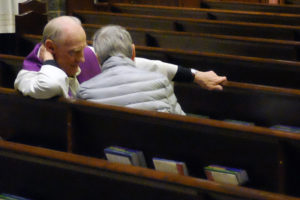Emphasizing the generosity of a merciful God, Pope Francis notes that the faithful can gain an indulgence in the Year of Mercy.

Father Lou Leonhardt hears a confession at a communal penance service at St. Patrick Parish in Iowa City Dec. 14. Confession is one of the conditions for gaining a plenary indulgence.
So, what exactly is an indulgence? “An indulgence is a remission before God of the temporal punishment due to sins whose guilt has already been forgiven, which the faithful Christian who is duly disposed gains under certain prescribed conditions through the action of the Church which, as the minister of redemption, dispenses and applies with authority the treasury of the satisfactions of Christ and the saints” (from the Catechism of the Catholic Church, No.1 471).
The official definition of indulgence is pretty dense. At its root, it means to show kindness or tenderness, leniency or mercy. Indulgences are about actual grace, God’s gift to us — not something we “earn.” Next, consider the term remission. What is remitted? The “temporal punishment” due to sins that have already been forgiven. Indulgences do not forgive sins but are about healing the consequences or effects of that sin. Some indulgences remit all of the effect (a “plenary” indulgence) and some remit only part (a “partial” indulgence).
In reforming the practice of indulgences in the wake of Vatican II, Pope Paul VI wanted to make clear that the ultimate purpose of indulgences is conversion, about helping us to become more Christ-like by freeing us from the effects of sin (especially our attachment to it).
How do indulgences work? While ministered by the church, the efficacy of indulgences is based solely in what Christ has done — directly or in the lives of the saints. Traditionally, we have referred to the “treasury” of “merits” (“satisfactions”) of Christ and the saints that the church dispenses. If we take this metaphor too literally, we end up thinking of some kind of divine bank account that Christ and the saints put deposits into and then the church makes withdrawals on our behalf. On the one hand, this way of talking about indulgences reminds us that we do not earn anything; this is a gift in which we cooperate. We need to be careful not to turn the journey of conversion into a financial deal, and grace into a “thing.”
We must always keep in mind that Christ is the ultimate agent of reconciliation; what the church does is carry on Christ’s ministry of reconciliation. Second, in the case of indulgences, what the church does is intercede for the penitent, in a sense asking that conversion (the fruit of penance) would come more easily and quickly. Third, indulgences are efficacious (they “work”) only because Christ has promised to answer such a prayer. Fourth, we receive grace, help in the journey of conversion. The effects of such grace are conditioned by the openness/contrition of the penitent (conditions of the indulgence). Finally, because of our communion in Christ, the prayers of the saints also aid us in our journey of conversion.
In order to gain any indulgence, the recipient must be baptized, not excommunicated, have the intention of gaining the indulgence, and be in a state of grace at least by the time the indulgenced works are completed (Norm No. 17). The acts or prescribed works should not be seen as “magical” (forcing God to do something in an automatic way) but as evidence of and aids in conversion of heart.
If you do these works by yourself, do they help? Of course! But if you make them part of an indulgence, you are also helped by the prayer of the church (Norm No. 4).
The conditions for a plenary indulgence require some brief comments (Norm No. 20). Confession, Communion, and the prayers for the intentions of the Holy Father (which can be as simple as an Our Father and Hail Mary) may take place several days before or after the indulgenced work. A single celebration of the sacrament of reconciliation may be applied to several indulgences, but Communion and the prayers for the Holy Father may only apply to one. The issue of attachment to sin is the most difficult, and points to the ultimate purpose of indulgences. It means not only committing to avoid sinning, but also to avoid any affection for or attraction to sin. This means that temptations are immediately set aside and any venial sin is immediately repented of and addressed.
Conditions for gaining a partial indulgence
• Be baptized, not excommunicated, and in a state of grace.
• Have the intention of gaining the indulgence (including being contrite).
• Perform the work or offer the prayers as described (see below for special indulgences during the Year of Mercy).
• May be obtained more than once per day.
Conditions for gaining a plenary indulgence
In addition to the above:
• Exclude all attachment to sin.
• Go to sacramental confession.
• Receive Eucharistic Communion.
• Pray for the intentions of the Holy Father.
• May be obtained only once per day. If any component is lacking, the indulgence will be partial.
Indulgenced works during the Jubilee Year include:
*Those who make a pilgrimage to and pass through the Holy Door or Door of Mercy at one of the designated pilgrimage sites (there are nine in the Diocese of Davenport). The jubilee indulgence should be linked to the sacrament of reconciliation and to the celebration of the Eucharist with a reflection on mercy. It will be necessary to accompany these celebrations with the profession of faith and with prayer for Pope Francis and for his intentions.
* The sick and the elderly who are unable to go on pilgrimage may receive the jubilee indulgence by living with faith and joyful hope this moment of trial [and] receiving Communion or attending Mass and community prayer, even through the various means of communication.”
*Individuals who are incarcerated. They may obtain the indulgence in prison chapels.
* Individuals who perform the spiritual and corporal works of mercy.
**The pilgrimage sites with Holy Door/Door of Mercy in the Davenport Diocese by deanery: Jesus Christ, Prince of Peace, Clinton (Clinton Deanery); Sacred Heart Cathedral, Davenport (Davenport Deanery); St. Mary Church, Pella (Grinnell Deanery); St. Mary Church, Nichols, Iowa City Deanery; St. Paul Church, Burlington (Keokuk Deanery); and St. Mary of the Visitation, Ottumwa (Ottumwa Deanery). Churches founded by Father Samuel Mazzuchelli, OP: St. Anthony, Davenport; St. Paul, Burlington; St. Mary, Iowa City; and St. Mathias, Muscatine.
(This article is excerpted from the Diocese of Davenport’s Year of Mercy webpage. Here’s the link to read the full article: http://tinyurl.com/j6yx4kj











